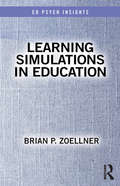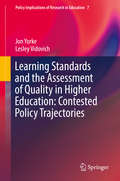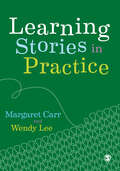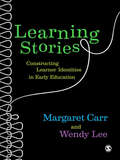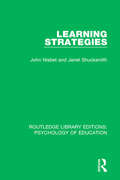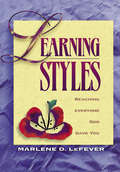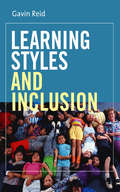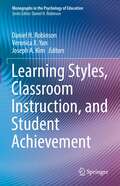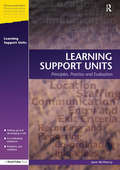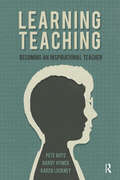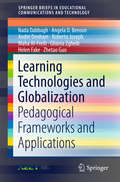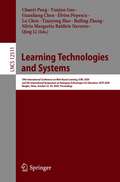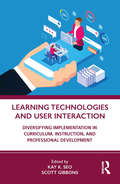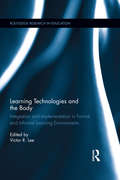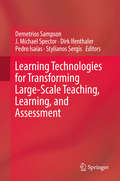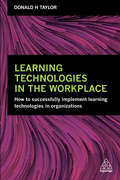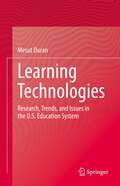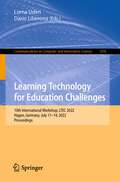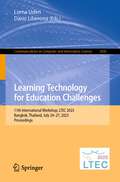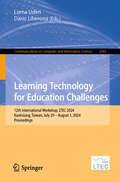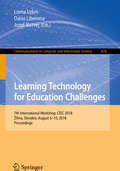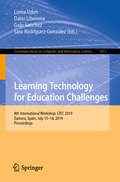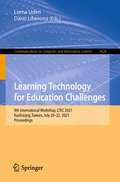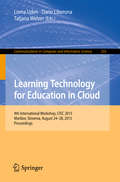- Table View
- List View
Learning Simulations in Education (Ed Psych Insights)
by Brian P. ZoellnerTechnology-enabled simulations are increasingly used for students in K-12 education and have the potential to improve teaching and learning across domains. Across five chapters, this book explores the psychological foundation of simulation use in instruction, guiding readers through individual differences among learners and contexts while addressing theory, pedagogy, cognitive processes, and more. This concise volume is designed for any education course that includes simulations in the curriculum and will be indispensable for student researchers and both pre- and in-service teachers alike.
Learning Standards and the Assessment of Quality in Higher Education: Contested Policy Trajectories
by Jon Yorke Lesley VidovichThis book analyses accountability and quality policies relating to learning standards and examines their implications for assessment in higher education. Whilst primarily focusing on the Australian setting, this analysis is located within a broader frame of reference that includes the United Kingdom (UK), the United States of America (US), and the Organisation for Economic Cooperation and Development (OECD). Across these settings, comparative measures of learning have been seen as a policy 'solution' to the problem of 'proving quality' in a globalised and increasingly competitive higher education market. Comparative measures of learning depend on the specification of learning standards. Learning standards attempt to articulate the capabilities expected of graduates, and students' achievement of these is determined through the practices of assessment carried out within institutions. Quality policy, learning standards and assessment practices all intersect within the broader umbrella of accountability, with relevance to governments, higher education providers, employers, parents, and students. The findings reported in this book highlight a number of policy influences, including the rising demands for national and international comparative data on learning standards to compare quality and inform student choice in a globally competitive market.
Learning Stories in Practice
by Ms Wendy Lee Margaret CarrMargaret Carr and Wendy Lee have often been asked for a follow-on practical companion to their seminal 2012 book Learning Stories; a complimentary book that provides practical advice for teachers who are embarking on a ‘narrative assessments-for-learning’ journey. After much anticipation that book is here at last! Packed with a wide range of full-colour examples of real life learning stories from all over the world this practical guide is influenced by their ongoing work with teachers across many countries and the thoughtful comments and questions that teachers have asked during conversations at conferences, lectures and professional development programmes. They have turned these conversations with teachers and students into key ideas, and a practical framework on how to initiate and create good learning stories and why they are valuable. They show you how to write stories that capture the magic and excitement of each young child's journey through the early years and how to develop a deep professional understanding of the learning that takes place during this special and influential time in their lives.
Learning Stories in Practice
by Ms Wendy Lee Margaret CarrMargaret Carr and Wendy Lee have often been asked for a follow-on practical companion to their seminal 2012 book Learning Stories; a complimentary book that provides practical advice for teachers who are embarking on a ‘narrative assessments-for-learning’ journey. After much anticipation that book is here at last! Packed with a wide range of full-colour examples of real life learning stories from all over the world this practical guide is influenced by their ongoing work with teachers across many countries and the thoughtful comments and questions that teachers have asked during conversations at conferences, lectures and professional development programmes. They have turned these conversations with teachers and students into key ideas, and a practical framework on how to initiate and create good learning stories and why they are valuable. They show you how to write stories that capture the magic and excitement of each young child's journey through the early years and how to develop a deep professional understanding of the learning that takes place during this special and influential time in their lives.
Learning Stories: Constructing Learner Identities in Early Education
by Dr Margaret Carr Ms Wendy LeeShortlisted for the 2013 Nursery World Awards! Margaret Carr's seminal work on Learning Stories was first published by SAGE in 2001, and this widely acclaimed approach to assessment has since gained a huge international following. In this new full-colour book, the authors outline the philosophy behind Learning Stories and refer to the latest findings from the research projects they have led with teachers on learning dispositions and learning power, to argue that Learning Stories can construct learner identities in early childhood settings and schools. By making the connection between sociocultural approaches to pedagogy and assessment, and narrative inquiry, this book contextualizes Learning Stories as a philosophical approach to education, learning and pedagogy. Chapters explore how Learning Stories: - help make connections with families - support the inclusion of children and family voices - tell us stories about babies - allow children to dictate their own stories - can be used to revisit children's learning journeys - can contribute to teaching and learning wisdom This ground-breaking book expands on the concept of Learning Stories and includes examples from practice in both New Zealand and the UK. It outlines the philosophy behind this pedagogical tool for documenting how learning identities are constructed and shows, through research evidence, why the early years is such a critical time in the formation of learning dispositions. Margaret Carr is a Professor of Education at the University of Waikato, New Zealand. Wendy Lee is Director of the Educational Leadership Project, New Zealand.
Learning Strategies (Routledge Library Editions: Psychology of Education)
by John Nisbet Janet ShucksmithOriginally published in 1986, designed for teachers and those concerned with the education of primary and secondary school pupils, Learning Strategies presented a new approach to ‘learning to learn’. Its aim was to encourage teachers to start thinking about different approaches to harnessing the potential of young learners. It was also relevant to adult learners, and to those who teach them. Thus, although about learning, the book is also very much about teaching. Learning Strategies presents a critical view of the study skills courses offered in schools at the time, and assesses in non-technical language what contributions could be made to the learning debate by recent developments in cognitive psychology. The traditional curriculum concentrated on ‘information’ and developing skills in reading, writing, mathematics and specialist subjects, while the more general strategies of how to learn, to solve problems, and to select appropriate methods of working, were too often neglected. Learning to learn involves strategies like planning ahead, monitoring one’s performance, checking and self-testing. Strategies like these are taught in schools, but children do not learn to apply them beyond specific applications in narrowly defined tasks. The book examines the broader notion of learning strategies, and the means by which we can control and regulate our use of skills in learning. It also shows how these ideas can be translated into classroom practice. The final chapter reviews the place of learning strategies in the curriculum.
Learning Styles
by Marlene LefeverLearning Styles is full of practical, helpful, and eye-opening information about the different ways kids perceive information and then use that knowledge, as well as how their behavior is often tied to their particular learning style. When we understand learning styles--imaginative, analytic, common sense, and dynamic--and adjust our teaching or parenting to those styles, we begin reaching everyone God gives us to teach.
Learning Styles and Inclusion
by Gavin Reid′[Gavin Reid] provides some useful links to websites devoted to different approaches. Some of the ideas relating to specific areas of the curriculum, for example, the suggested approaches to the teaching of modern languages, are likely to be particularly valuable. Reid also outlines strategies using learning styles for pupils with learning differences, including attention disorders, dyslexia, developmental co-ordination difficulties, number difficulties, and those on the autistic spectrum′ - Times Educational Supplement Extra for Special Needs `We have been lucky enough to hear Gavin speak twice in the last year and those of you who have also heard him will know that he is at the cutting edge of his field. This book really encompasses those areas that are particularly topical and the "buzz" words on everyone′s lips! This book clearly sets out "who" is involved in inclusion and "what" is actually meant by learning styles. Gavin not only offers practical strategies but also suggests how "old hands" could vary their teaching styles to appeal to all types of learners. Therefore we feel this book is for the main stream teacher as well as the specialist and, if this is a target area for your school, this book might be a valuable addition to your bookshelf′ - SATIPS `In this book, Gavin Reid has grasped the nettle (of inclusion) with both hands and provided a text that is full of common sense and practical suggestions as to how the mainstream teacher can draw upon recent psychological theory and research to enhance the learning of all children. He jumps on no bandwagons but draws judiciously from a wide range of approaches to assessing learning styles and links what can be learned about groups and individuals from such techniques to helpful classroom practice′ - Professor Bob Burden, School of Education and Lifelong Learning, University of Exeter `Gavin Reid is that rare professional who not only explains how and why children learn best, but also suggests a myriad of practical strategies to help them. I highly recommend this book for everyone from undergraduates to "old hands" working toward successful inclusion. Parents, too, will profit from Dr. Reid′s wise and comprehensive experience′ - Jane M. Healy, Ph.D., Educational Psychologist and Author of "Your Child′s Growing Mind: Brain Development and Learning from Birth to Adolescence." 3rd Edition. NY: Broadway Books, 2004. Drawing on his considerable experience as a teacher, educational psychologist, lecturer and author, Gavin Reid illustrates how to assess pupils′ different learning styles and how to vary your teaching style to appeal to all types of learners, including disaffected students and those with special educational needs. This book provides an overview of the different stages in the learning cycle; describes the differences between learners; and emphasizes the role the classroom environment and different teaching styles play in children′s ability to learn. Readers will see how an understanding of learning styles can be used to encourage and promote good inclusive practice. Ideas for assessment of learning styles and examples of different teaching styles will prove invaluable to class teachers, trainee teachers, SENCOs, LEA advisers; NQTs and NQT advisers and school management
Learning Styles, Classroom Instruction, and Student Achievement (Monographs in the Psychology of Education)
by Daniel H. Robinson Veronica X. Yan Joseph A. KimThe book examines the history of learning styles, including their widespread acceptance and endorsement in educational settings. In addition, it explores both the support of and opposition to learning styles by academics. The book discusses cases for and against learning styles and offers a systematic review of empirical evidence. It describes consequences of promoting learning styles in the classroom and offers insights into future directions in research and practice.The book offers a critical examination that adds to the broader discussion of what is truthful and what is fake news in education.Key areas of coverage include:History of learning styles.Widespread belief in and uses of learning styles.Review of recent learning styles coverage in academic journals.The case for learning styles.The case against learning styles.Consequences associated with using learning styles. Learning Styles, Classroom Instruction, and Student Achievement is an essential resource for researchers, professors, and graduate students as well as teachers and educational professionals in such varied fields as clinical child and school psychology, educational psychology, social work, public health, teaching and teacher education, and educational practice and policy.
Learning Support Units: Principles, Practice and Evaluation
by Jane McSherryLearning support units (LSU) are an important piece in the jigsaw of educational and social inclusion. This book will help plan and run an effective LSU that is part of a whole school approach.
Learning Teaching: Becoming an inspirational teacher
by Pete Boyd Barry Hymer Karen LockneyThis essential and aspirational text is aimed at all beginning teachers whatever your training route, age phase and setting. It explicitly adopts and builds on a new metaphor for teachers' professional learning as interplay between the body of public knowledge and the practical wisdom of teachers within a particular school setting. It also accepts that 'telling' you how to teach is ineffective; you need to 'become a teacher' because it involves identity and practice. Inquiry-based critically reflective learning with a clear focus on the learning of pupils is proposed as the core strategy by which you can build your knowledge and skills to become an outstanding teacher.Core topics, including planning, inclusion, teaching, assessment and professional development, are tackled in an accessible and refreshing way, using key research informed evidence. The focus is relentlessly on 'learning' rather than performance, in order to support you becoming an excellent professional teacher, rather than a competent technician, who makes a difference to learners, colleagues, schools and policy. Think of this book as a temporary or additional mentor, challenging you with different ways of thinking about learning and providing strategies to guide your professional learning.“It takes 10 years or more to begin to be a brain surgeon, but sometimes we get 1-3 years at most before we are allowed to work with children’s brains as teachers. So we need inspirational teachers and this is the focus of this compact, powerful and insightful book. It is wonderfully designed around five of the most critical dilemmas in our classrooms: belief vs. ability; autonomy vs. compliance; abstract vs. concrete; feedback vs. praise; and collaboration vs. competition. The power of the book is that it illustrates the new move to focus on learning power – and such a focus permits every student to become smarter through effort and deep practice as they struggle with the high-challenge learning activities – in the presence of inspirational, impactful and passionate teachers. The perfect book for those who want to make most of their opportunity to enhance students’ brain power.” John Hattie, Director, Melbourne Education Research Institute.
Learning Technologies and Globalization
by Nada Dabbagh Angela D. Benson André Denham Roberto Joseph Maha Al-Freih Ghania Zgheib Helen Fake Zhetao GuoThis brief describes the evolutionary and global impact of the techno-social transformation on learning technologies in terms of emerging pedagogical frameworks and applications. it provides examples of such applications in higher education, K-12, and the workplace, across the globe. The transformation and diffusion of ICT into an ever-present and accessible phenomenon is fundamentally shaping human activity and culture, changing human identity, and redefining globalization. Global activities have widened, intensified, and accelerated as a result of ICT integration generating a new awareness of the world as a techno-social environment. This emergent global environment is introducing unprecedented socio-economic opportunities; however, it is also bringing new risks and challenges, particularly as this relates to learning technologies, most especially in higher education contexts.
Learning Technologies and Systems: 19th International Conference on Web-Based Learning, ICWL 2020, and 5th International Symposium on Emerging Technologies for Education, SETE 2020, Ningbo, China, October 22–24, 2020, Proceedings (Lecture Notes in Computer Science #12511)
by Qing Li Elvira Popescu Yunjun Gao Lu Chen Tianyong Hao Chaoyi Pang Guanliang Chen Bailing Zhang Silvia Margarita Baldiris NavarroThis book constitutes the refereed conference proceedings of the 19th International Conference on Web-Based Learning, ICWL 2020, and 5th International Symposium on Emerging Technologies for Education, SETE 2020, held in Ningbo, China in October 2020.Together for the ICWL 2020 Conference and SETE 2020 Symposium 39 full papers were accepted together with 31 short papers out of 233 submissions. The papers focus on the following subjects: Semantic Web for E-Learning, through Learning Analytics, Computer-Supported Collaborative Learning, Assessment, Pedagogical Issues, E-learning Platforms, and Tools, to Mobile Learning and much more.
Learning Technologies and User Interaction: Diversifying Implementation in Curriculum, Instruction, and Professional Development
by Kay K. Seo Scott GibbonsLearning Technologies and User Interaction explores the complex interplay between educational technologies and those who rely on them to construct knowledge and develop skills. As learning and training continue to move onto digital platforms, tools such as artificial intelligence, predictive analytics, video games, virtual reality, and more hold considerable potential to foster advanced forms of synergy across contexts. Showcasing a variety of contributors who are attuned to today’s networked technologies, environments, and learning dynamics, this book is ideal for students and scholars of educational technology, instructional design, professional development, and research methods.
Learning Technologies and the Body: Integration and Implementation In Formal and Informal Learning Environments (Routledge Research in Education #135)
by Victor R. LeeThis volume explores how technology-supported learning environments can incorporate physical activity and interactive experiences in formal education. It presents cutting-edge research and design work on a new generation of "body-centric" technologies such as wearable body sensors, GPS tracking devices, interactive display surfaces, video game controller devices, and humanlike avatars. Contributors discuss how and why each of these technologies can be used in service of learning within K-12 classrooms and at home, in museums and online. Citing examples of empirical evidence and specific implementation, this timely and critical volume examines how body responsive technologies are being used within the educational community to advance the next generation of educational technology.
Learning Technologies for Transforming Large-Scale Teaching, Learning, and Assessment
by Dirk Ifenthaler J. Michael Spector Pedro Isaías Demetrios Sampson Stylianos SergisThis volume provides a contemporary glance at the drastically expanding field of delivering large-scale education to unprecedented numbers of learners. It compiles papers presented at the CELDA (Cognition and Exploratory Learning in the Digital Age) conference, which has a goal of continuing to address these challenges and promote the effective use of new tools and technologies to support teaching, learning and assessment. Given the emerging global trend to exploit the potential of existing digital technologies to improve the teaching, learning and assessment experiences for all learners in real-life contexts, this topic is a unifying theme for this volume.The book showcases how emerging educational technologies and innovative practices have been used to address core global educational challenges. It provides state-of-the-art insights and case studies of exploiting innovative learning technologies, including Massive Open Online Courses and educational data analytics, to address key global challenges spanning from online Teacher Education to large-scale coding competence development. This volume will be of interest to academics and professional practitioners working in the area of digital technology integration in teaching, learning and assessment, as well as those interested in specific conference themes (e.g., designing and assessing learning in online environments, assessing learning in complex domains) and presenters, invited speakers, and participants of the CELDA conference.
Learning Technologies in the Workplace: How to Successfully Implement Learning Technologies in Organizations
by Donald H TaylorKnowledge was once power - difficult to find, slow to transmit and coveted. Now we can access almost the sum total of human information with a swipe of our thumbs. The impact on the knowledge economy has been vast, leaving learning and development (L&D) professionals wondering how to keep pace. Many organizations naturally turn to technology to ensure workplace learning at scale and at speed, but stumble when it comes to successfully deploying and using it. Learning Technologies in the Workplace examines 16 years of learning technology implementations to find the secrets behind the most successful.Examples in the book from the Hershey Company and BP, airlines, tech companies and manufacturers point to four common factors. Successful learning technology teams all have APPA: a clear aim, a people focus, a wide perspective and a pragmatic, can-do attitude. Learning Technologies in the Workplace gives readers practical pointers for each of these four points, helping them implement and use learning technologies well, with particular emphasis on the essential skill of identifying stakeholders and winning their support.
Learning Technologies: Research, Trends, and Issues in the U.S. Education System
by Mesut DuranWith a historical context covering the past 20 years, this book provides in-depth discussions of research, trends, and issues related to learning technologies in K-12 schools, higher education settings, and educational administration in the U.S. Given the remote learning challenges and opportunities that the COVID-19 pandemic has recently brought to our attention, world-wide interest in educational technology-related issues is at its peak. Therefore, this book is specifically directed at the entire educational technology field, educators, educational leaders, researchers, and policymakers alike who are interested in learning technologies in the U.S. educational system.Three main resources guide the discussions in the book. First, an extensive literature review related to the book’s central focus—learning technologies in the U.S. education system, including relevant studies published over the last two decades-is presented. Second, reflections on the author's twenty years of professional teaching, research, and scholarship focused on educational technology at a major U.S. research university are provided. And third, the viewpoints of students in the graduate—level educational technology courses taught by the author, presenting the vital perspective of practicing teachers and educational leaders regarding how learning technologies affect their schools and their work within them, are considered. All of these perspectives and data combine to provide a comprehensive overview on the topic of learning technologies in the U.S. education system. Together, they create a book that is indispensable for anyone interested in learning technologies in education.
Learning Technology for Education Challenges: 10th International Workshop, LTEC 2022, Hagen, Germany, July 11–14, 2022, Proceedings (Communications in Computer and Information Science #1595)
by Lorna Uden Dario LiberonaThis book constitutes the refereed proceedings of the 10th International Workshop on Learning Technology for Education Challenges, LTEC 2022, held in Hagen, Germany, in July 2022. The 14 revised full papers and 6 short papers presented were carefully reviewed and selected from 41 submissions. The papers are organized in the following topical sections: learning methodologies and pandemic impact; learning practices and methodologies; learning technologies; learning technologies performance; serious games and virtual learning environments.
Learning Technology for Education Challenges: 11th International Workshop, LTEC 2023, Bangkok, Thailand, July 24–27, 2023, Proceedings (Communications in Computer and Information Science #1830)
by Lorna Uden Dario LiberonaThis book constitutes the refereed proceedings of the International Workshop on Learning Technology for Education Challenges, LTEC 2023, held in Bangkok, Thailand, during July 24–27, 2023.The 27 full papers included in this book were carefully reviewed and selected from 53 submissions. They were organized in topical sections as follows: serious games and virtual learning environments; learning practices and methodologies; learning technologies; learning mehtodologies and models; learning technologies performance.
Learning Technology for Education Challenges: 12th International Workshop, LTEC 2024, Kaohsiung, Taiwan, July 29 – August 1, 2024, Proceedings (Communications in Computer and Information Science #2082)
by Lorna Uden Dario LiberonaThis book constitutes the refereed proceedings of the 12th International Conference on Learning Technology for Education Challenges, LTEC 2024, held in Kaohsiung, Taiwan, during July 29–August 1, 2024. The 26 full papers included in this book were carefully reviewed and selected from 51 submissions. They were organized in topical sections as follows: serious games and virtual learning environments; learning practices and methodologies; learning technologies; learning processes and culture; e-learning and performance, and artificial intelligence and learning.
Learning Technology for Education Challenges: 7th International Workshop, LTEC 2018, Žilina, Slovakia, August 6–10, 2018, Proceedings (Communications in Computer and Information Science #870)
by Lorna Uden Dario Liberona Jozef RistvejThis book constitutes the refereed proceedings of the 7th International Workshop on Learning Technology for Education Challenges, LTEC 2018, held in Žilina, Slovakia, in August 2018. The 25 revised full papers presented were carefully reviewed and selected from 54 submissions. The papers are organized in the following topical sections: Gamification and learning; learning and knowledge transfer; learning technologies applications; virtual learning environments; and mobile learning and MOOCs. LTEC 2018 examines how these technologies and pedagogical advances can be used to change the way teachers teach and students learn, while giving special emphasis to the pedagogically effective ways we can harness these new technologies in education.
Learning Technology for Education Challenges: 8th International Workshop, LTEC 2019, Zamora, Spain, July 15–18, 2019, Proceedings (Communications in Computer and Information Science #1011)
by Lorna Uden Dario Liberona Galo Sanchez Sara Rodríguez-GonzálezThis book constitutes the refereed proceedings of the 8th International Workshop on Learning Technology for Education Challenges, LTEC 2019, held in Zamora, Spain, in July 2019.The 41 revised full papers presented were carefully reviewed and selected from 83 submissions. The papers are organized in the following topical sections: learning technolgies; learning tools and environment; e-learning and MOOCs; learning practices; social media learning tools; machine learning and evaluation support programs. LTEC 2019 examines how these technologies and pedagogical advances can be used to change the way teachers teach and students learn, while giving special emphasis to the pedagogically effective ways we can harness these new technologies in education.
Learning Technology for Education Challenges: 9th International Workshop, LTEC 2021, Kaohsiung, Taiwan, July 20-22, 2021, Proceedings (Communications in Computer and Information Science #1428)
by Lorna Uden Dario LiberonaThis book constitutes the refereed proceedings of the 9th International Workshop on Learning Technology for Education Challenges, LTEC 2021, held in Kaohsiung, Taiwan, in July 2021. The 11 revised full papers and 6 short papers presented were carefully reviewed and selected from 83 submissions. The papers are organized in the following topical sections: learning tools and environment; e-learning and transferability strategies; serious games technologies; learning practices and knowledge transfer.
Learning Technology for Education in Cloud
by Lorna Uden Dario Liberona Tatjana WelzerThis book constitutes the refereed proceedings of the Fourth International Workshop on Learning Technology for Education in Cloud, LTEC 2015, held in Maribor, Slovenia, in August 2015. The 24 revised full papers presented were carefully reviewed and selected from 46 submissions. The papers cover various aspects of technologies for learning, such as MOOC challenges; cooperative learning; learning engineering; learning tools and environments; STEM.
